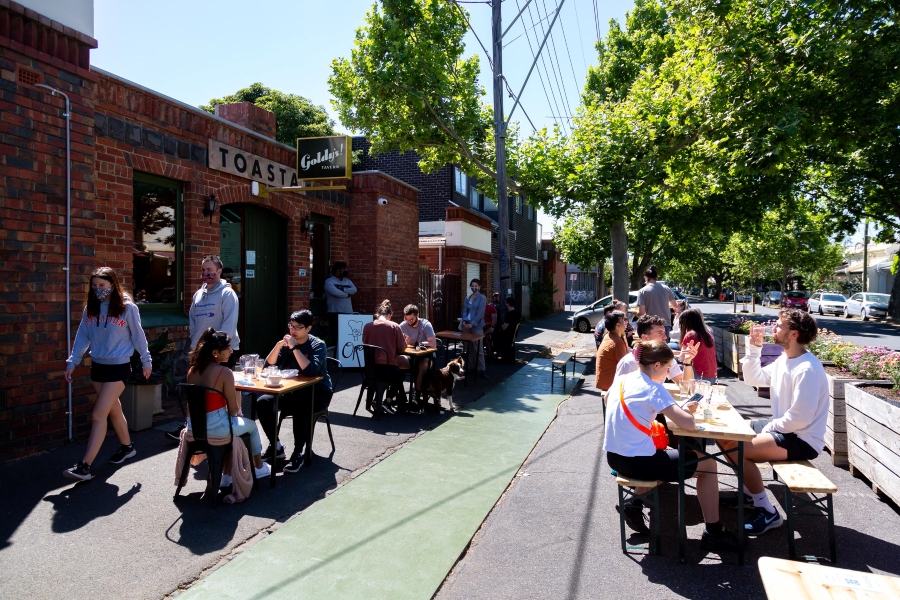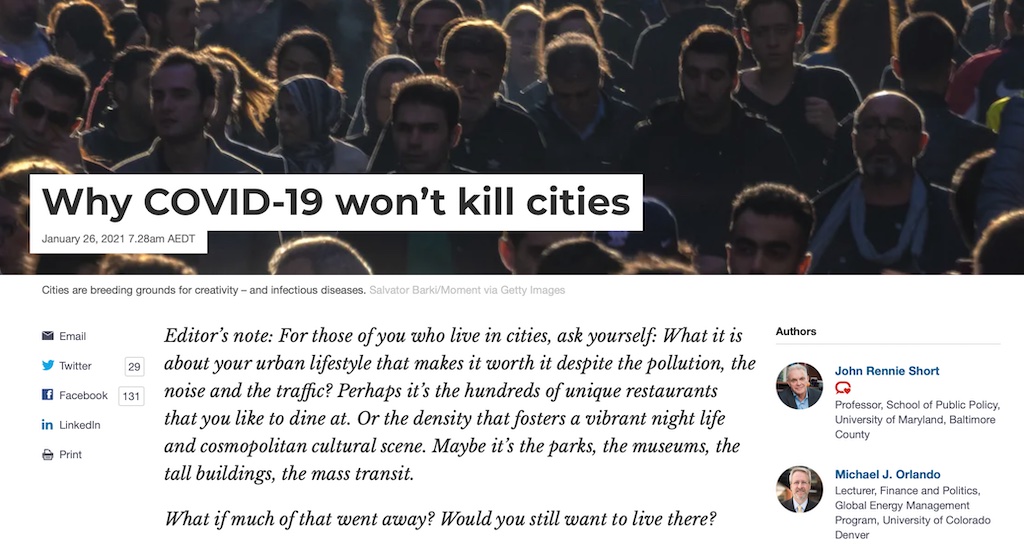In October 2020, the City of Yarra announced a temporary parklet program, enabling traders to occupy on-street car parking bays with parklets for outdoor dining. Council resolved to not charge any fees during the temporary period.

On 2nd February 2021, council resolved to conduct community engagement on the parklet program.
On 2nd March 2021, council heard that the community showed clear and widespread support for parklets. Council resolved to:
- extend the temporary parklet program until end June 2021, to
- not charge any fees until end June 2021, and to
- conduct research regarding what fees should be charged after COVID.
On 13th and 14th May 2021 council held information sessions on a proposed post-COVID fee structure.
On 1st June 2021, council again heard that the community showed clear and widespread support for parklets, although some traders criticised the program, stating that they are at a competitive disadvantage because their competitors are not paying for the parklets.

Council resolved to extend the temporary parklet program to 31st October 2021, and to adopt a post-COVID fee structure per car parking bay, at three levels, $2,250, $3,000 or $5,000 per year. The video record shows that:
- Cr Jolly stated, as an introduction to a question to an officer, that he agreed with the officer recommendations.
- The motion was moved by Cr Wade and seconded by Cr Landes, with an amendment moved by Cr de Vietri, to clarify that the start of fees will be delayed if COVID lockdowns continue.
- Cr Jolly was also willing to second the resolution.
- The motion was supported by all councillors present, including Cr Jolly. Cr O’Brien and Cr Nguyen were not on-screen during the vote.
On 5th October 2021, council resolved to:
- adopt a formal Parklet Policy and Design Guidelines,
- retain the post-COVID fee structure,
- not charge any fees until at least 1st April 2022, and
- apply a 25% discount from 1st April 2022.
Clearly, council retains the option to re-examine any policy at any time, e.g. if circumstances change. This vote was split 4 to 4, requiring the mayor to use a casting vote to carry the motion.
- For the motion: Cr de Vietri, Cr Wade, Cr Stone, Cr Crossland, with a casting vote from Mayor de Vietri
- Against the motion: Cr Jolly, Cr O’Brien, Cr Landes, Cr Nguyen
Reasons for voting against
Streets Alive Yarra invited the four dissenting councillors to clarify why they voted against the motion.
- Cr Jolly stated that he would have supported the motion if a decision on fees had been deferred until March 2022, i.e. until after council had lobbied the state government for financial support for the program. Cr Jolly also stated, ‘This is a kick in the teeth to those hospitality businesses and their staff who manage to survive the lockdowns.’
- Cr O’Brien stated that she would have supported the motion if a decision on fees had been deferred until March 2022, i.e. when there will be more certainty regarding COVID. Cr O’Brien also stated that she would prefer parklets to be available to all businesses, not just hospitality businesses.
- Cr Landes stated that he would have supported the motion if the fees that apply from 1st April 2022 were set to match those in the City of Melbourne.
- Cr Nguyen did not comment.
Our assessment
We do not agree with Cr Jolly’s justifications for voting against. Council has plenty of time to lobby the state government for financial support, and if council is successful, it can adjust the fees. Council is not delivering ‘a kick in the teeth‘, instead council is offering some traders an opportunity, which is not available to all traders, and which traders are free to accept or reject.
We do not agree with Cr O’Brien’s justifications for voting against. Council has plenty of time to monitor COVID and to defer the start of fees if lockdowns continue. We do agree with Cr O’Brien’s suggestion for council to consider offering parklets to all businesses, not just hospitality.
We do not agree with Cr Landes’ justifications for voting against. The City of Melbourne has adopted parklet pricing:
- that ranges from $1,840 to $8,000 per year,
- with fees starting on 1st April,
- with a 75% discount for the first three months to 30th June 2022,
- with a 50% discount from 1st July 2022 to 30th June 2023.
The prices are comparable, $8,000 in Melbourne vs $5,000 in Yarra. The primary different with the City of Yarra is that the City of Melbourne is offering a 75% discount instead of Yarra’s 25% discount. The City of Melbourne is able to do this because they have received multiple grants from the state government:
- $100 million Melbourne City Recovery Fund, half from the state government
- $100 million Central City Reactivation Fund, half from the state government
- $200 million Melbourne City Revitalisation Fund, half from the state government
We do not agree with Cr Landes publishing a pre-determined position on the motion, on 5th October, prior to the council meeting. This appears to be a breach of the councillor code of conduct, requiring councillors to keep an open mind before the council meeting.


We do not agree with Cr Landes’ use of the term ‘sticker shock’, in two posts on 6th October 2021, considering that the pricing structure was consulted on in March 2021 and approved in June 2021. The pricing structure was not a shock to anyone, because it had been known for months, i.e. since the council meeting on 1st June 2021. Nor was the date for introducing the fees a shock, because the fees would not be introduced until 1st April 2022.

We do not agree with Cr Nguyen failing to offer comment. When a vote is balanced at 4-4 we think it is reasonable to expect councillors to offer comment on why they voted in a certain way.
What is the annual value of a car park?
The annual value of public land, e.g. an on-street car park, can be determined in a variety of ways:
- Price of the land. For example:
- Land in Yarra has a value of $7,900 per m². A parking spot is 5.5 m x 2.5 m or 14 m². If the annual value is 3% of land value, e.g. half the 7% used for rental properties, then 3% of 14 m² times $7,900 per m² = 3% of $110,000 = $3,300 per year. This is consistent with council’s valuations for parklets, which range from $2,250 to $5,000.
- Price people are willing to pay for parking. For example:
- The price for a permanent parking bay shown on Parkhound varies from $2,000 to $5,000 per year, depending on location. This is consistent with council’s valuations for parklets, which range from $2,250 to $5,000.
- The price for a parking meter is $4 per hour. In the council meeting on 5th October 2021, an officer stated that in the primary areas (where parklets are offered at $5,000) parking revenue is approximately $7,800 per year (time stamp 2:31). This indicates that the $5,000 parklet fee would be a discount of 35% from pre-COVID earnings.
- Demand responsive pricing. For example:
- Price varies with demand, and targets 85% occupancy, e.g. in COVID times the occupancy is low and the price falls to zero. Post-COVID, if occupancy of parking bays on shopping streets regularly exceed 85%, the price climbs as required, e.g. to $4 or $6 per hour. We don’t have data on the demand responsive value of parking in Yarra, because council doesn’t use this method.
Pre-COVID vs post-COVID value
We do not agree with Cr Landes imputation (time stamp 2:40) and assertion (time stamp 2:58) that the pricing is based on pre-COVID and thus is not relevant for post-COVID. The pricing of $5,000 in primary areas is offered at a discount of 35% to pre-COVID levels, and thus remains conservative for post-COVID.

Letter from the Minister for Small Business
On 6th October 2021 the Minister for Small Business wrote to the City of Yarra, regarding the parklet fee structure, including ‘On behalf of the Victorian Government and the many struggling cafes, pubs and restaurants in your local government area, I urge you to reconsider this policy.‘ The position of the state government is absurd. The fees are intended to begin after COVID, offering traders an extra opportunity. If the state government wishes to support small business, the best thing it can do is to reconsider its own anti-business and unequal policies, such as:
- Banning parklets on Swan Street, Bridge Road and Victoria Street
- Offering over $100 million of grants to the City of Melbourne, but not to the City of Yarra
In addition, the state government should consider equity of financial support. Parklets at subsidised prices are only available to some businesses, which improves their competitive advantage in comparison with businesses who are not eligible. Thus, if governments do not levy market rates, they are most likely in breach of principles of competitive neutrality.


Conclusion
Council is right to continue to support the principles that:
- Public land has value
- Parklets are a better use of public land than on-street parking
- Council should not advantage one business to the detriment of another, i.e. fail to comply with competitive neutrality
- Council should consider not only the beneficiary, but also other businesses, ratepayers and residents
- Council can continue to monitor COVID and re-assess the situation at any time in the future, as required
Our assessment is that the core dispute was not over the valuation of the parking bays, but rather the discount that will be offered after COVID. Clearly, council retains the option to alter the discount at any time, simply by moving another motion. Thus, this core dispute is not justification for moving away from the previously adopted price structure.
Streets Alive Yarra stands by our public submission in support of the officer report and recommendation, and affirms our support for the motion that was passed.
Published 7th October 2021. Edited 15th October 2021 to correct the pre-COVID parking revenue from $12,800 to $7,800.
